 W
WThe Adamites, or Adamians, were adherents of an Early Christian group in North Africa in the 2nd, 3rd, and 4th centuries. They wore no clothing during their religious services. There were later reports of similar sects in Central Europe during the Late Middle Ages.
 W
WThe Camden 28 were a group of leftist, Catholic, anti-Vietnam War activists who in 1971 planned and executed a raid on a draft board in Camden, New Jersey, United States. The raid resulted in a high-profile criminal trial of the activists that was seen by many as a referendum on the Vietnam War and as an example of jury nullification.
 W
WThe Diggers were a group of religious dissidents in England, sometimes seen as forerunners of modern anarchism, and also associated with agrarian socialism and Georgism. Gerrard Winstanley's followers were known as True Levellers in 1649, in reference to their split from the Levellers, and later became known as Diggers because of their attempts to farm on common land.
 W
WThe Doukhobours or Dukhobors are a Spiritual Christian ethnoreligious group of Russian origin. They are one of many non-Orthodox ethno-confessional faiths in Russia, often categorized as "folk-Protestants", Spiritual Christians, sectarians, or heretics. They are distinguished as pacifists who lived in their own villages, rejected personal materialism, worked together, and developed a tradition of oral history and memorizing and singing hymns and verses. Before 1886, they had a series of single leaders. The origin of the Doukhobors is uncertain. The first written records of them are from 1701, although some scholars suspect earlier origins.
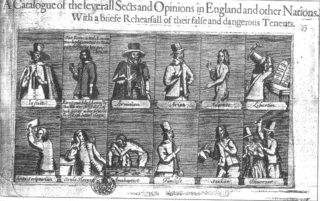 W
WEnglish Dissenters or English Separatists were Protestant Christians who separated from the Church of England in the 17th and 18th centuries.
 W
WChristian existentialism is a theo-philosophical movement which takes an existentialist approach to Christian theology. The school of thought is often traced back to the work of the Danish philosopher and theologian Søren Kierkegaard (1813–1855).
 W
WThe Familia Caritatis, also known as the Familists, was a mystical religious sect founded in the sixteenth century by Henry Nicholis, also known as Niclaes. Familia Caritatis translates from Latin into "Family of Love", and in other languages, "Hus der Lieften", "Huis der Liefde" and "Haus der Liebe".
 W
WThe Fifth Monarchists or Fifth Monarchy Men were an extreme Puritan sect active from 1649 to 1660 during the Commonwealth, following the English Civil Wars of the 17th century. They took their name from a prophecy in the Book of Daniel that four ancient monarchies would precede the kingdom of Christ. They also referred to the year 1666 and its relationship to the biblical Number of the Beast indicating the end of earthly rule by carnal human beings. They were one of a number of nonconformist dissenting groups that emerged around this time.
 W
WThe Irresistible Revolution: Living as an Ordinary Radical is a book by Shane Claiborne published in 2006. It describes and advocates what the author argues to be a truly Christian lifestyle. The author draws on his personal experience, including time spent in Calcutta, India with Mother Teresa, a trip with a Christian Peacemaker Team to Iraq during the 2003 US-led bombing campaign, and life in a communal house, The Simple Way, in Philadelphia, to describe the way he feels Christians ought to be living, the ways in which many currently are not, and the ways in which many are beginning to do so, the Revolution referenced in the title. The lifestyle Claiborne proposes rejects materialism and nationalism and emphasizes living in loving and close community with Christians and non-Christian, a voluntary redistribution of wealth along the lines of Early Christianity, and socially and environmentally conscious consumer choices, all based on love for God and love for all humans.
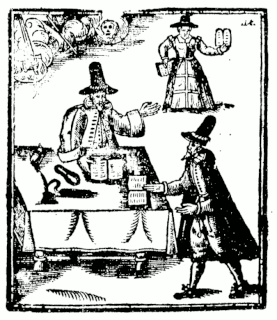 W
WThe Levellers were a political movement during the English Civil War (1642–1651) committed to popular sovereignty, extended suffrage, equality before the law and religious tolerance. The hallmark of Leveller thought was its populism, as shown by its emphasis on equal natural rights, and their practice of reaching the public through pamphlets, petitions and vocal appeals to the crowd.
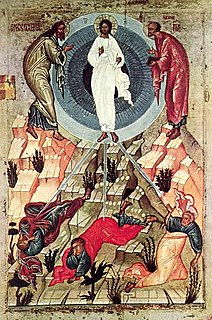 W
WChristian monasticism is the devotional practice of Christians who live ascetic and typically cloistered lives that are dedicated to Christian worship. It began to develop early in the history of the Christian Church, modeled upon scriptural examples and ideals, including those in the Old Testament, but not mandated as an institution in the scriptures. It has come to be regulated by religious rules and, in modern times, the Canon law of the respective Christian denominations that have forms of monastic living. Those living the monastic life are known by the generic terms monks (men) and nuns (women). The word monk originated from the Greek μοναχός, itself from μόνος meaning 'alone'.
 W
WThe Münster rebellion was an attempt by radical Anabaptists to establish a communal sectarian government in the German city of Münster – then under the large Prince-Bishopric of Münster in the Holy Roman Empire.
 W
WChristian naturism is the practise of naturism or nudism by Christians.
 W
WThe Ordinary Radicals is a 2008 documentary film directed by Philadelphia filmmaker Jamie Moffett.
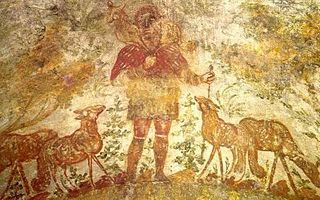 W
WThe Pact of the Catacombs is an agreement signed by 42 bishops of the Catholic Church at a meeting following Mass in the Catacombs of Domitilla near Rome on the evening of 16 November 1965, three weeks before the close of the Second Vatican Council. They pledged to live like the poorest of their parishioners and adopt a lifestyle free of attachment to ordinary possessions. The Pact said they would "try to live according to the ordinary manner of our people in all that concerns housing, food, means of transport.... We renounce forever the appearance and the substance of wealth, especially in clothing ... and symbols made of precious metals." More than 500 bishops added their signatures in the next few months. The catacombs were chosen for their association with early Christian martyrs in the centuries when the Church was without worldly power and existed in its simplest form.
 W
WProto-Protestantism, also called pre-Protestantism, refers to individuals and movements that propagated ideas similar to Protestantism before 1517, which historians usually regard as the starting year for the Reformation era.
 W
WRadical orthodoxy is a Christian theological and philosophical school of thought which makes use of postmodern philosophy to reject the paradigm of modernity. The movement was founded by John Milbank and others and takes its name from the title of a collection of essays published by Routledge in 1999: Radical Orthodoxy: A New Theology, edited by Milbank, Catherine Pickstock, and Graham Ward. Although the principal founders of the movement are Anglicans, radical orthodoxy includes theologians from a number of ecclesial traditions.
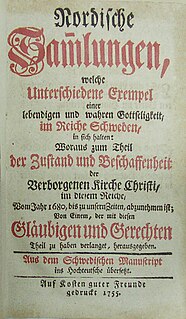 W
WRadical Pietism are Pietists who decided to break with denominational Lutheranism, forming separate Christian churches. Radical Pietists contrast with Church Pietists, who chose to remain within their Lutheran denominational settings. Radical Pietists distinguished between true and false Christianity.. They separated from established churches to form their own sects.
 W
WThe Radical Reformation represented a response to corruption both in the Catholic Church and in the expanding Magisterial Protestant movement led by Martin Luther and many others. Beginning in Germany and Switzerland in the 16th century, the Radical Reformation gave birth to many radical Protestant groups throughout Europe. The term covers radical reformers like Thomas Müntzer and Andreas Karlstadt, the Zwickau prophets, and Anabaptist groups like the Hutterites and the Mennonites.
 W
WRestorationism is the belief that Christianity has been or should be restored along the lines of what is known about the apostolic early church, which restorationists see as the search for a purer and more ancient form of the religion. Fundamentally, "this vision seeks to correct faults or deficiencies by appealing to the primitive church as a normative model."
 W
WThe term "Spiritual Christianity" refers to "folk Protestants" : non-Eastern Orthodox indigenous to the Russian Empire that emerged from among the Eastern Orthodox, and from the Bezpopovtsy Raskolniks. Their origin may be due to Protestant movements imported to Russia by missionaries, mixed with folk traditions, resulting in tribes of believers collectively called sektanty (sects). When discovered, these tribes were typically documented by Russian Orthodox Church clergy with a label that described them as heretics, and detailing their beliefs: not fasting, meeting on Saturday, rejecting the spirit, genital and breast mutilation, self-flagellation, and more.
 W
WStreetwise priests are Roman Catholic priests who exercise their spiritual mandate by living in structures in direct contact with the "street", which is their mission land. Historical streetwise priests include Philip Neri (1515–1595) and John Bosco (1815–1888).
 W
WThe Waldensians, Vallenses, Valdesi or Vaudois) are adherents of a proto-Protestant church tradition that began as an ascetic movement within Western Christianity before the Reformation.